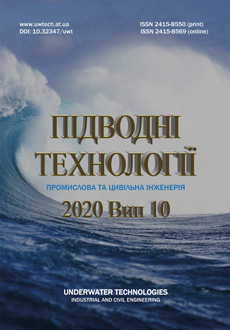A formal model of the human psyche life-supporting functions dialectic logic control
DOI:
https://doi.org/10.32347/uwt2020.10.1201Ключові слова:
axiomatic modeling, artificial intelligence, mathematical logic, thinkin, formalizationАнотація
A lot of research in the field of artificial intelligence cannot be completed, or carried out at all, due to the lack of at the moment a correct theory of the human brain functioning associated with its intellectual activity, at least at a conceptual level. So far, there are no comprehensive proposals by researchers on what principles should be based on models of elementary and structured meanings processed by the brain in the course of human life, not to mention formal languages and their grammars, or, especially, formal theories designed for these purposes. The purpose of this article is to fill the gap in scientific knowledge about the human brain. Academician P.K. Anokhin in 1984 proposed the concept of a model for organizing and regulating a behavioral act, in which there is a place for all basic processes and conditions. It was called the functional system model. With such a model, it becomes possible in the same vein, using axiomatic statements, to create a logical-dialectical model of the functioning process at the physiological level of any of the higher mental functions. The dialectical logic of controlling any human body functional systems follows from the conceptual knowledge of the vital functions of these functional systems, obtained exclusively by natural experimenting. Therefore, the conceptual knowledge of the vital functions of each studied functional system of a person should precede the description of the logic essence of its control. The human psyche is oneof the most important functional systems of the human body. The article presents the fundamental concepts of the vital functions of this system, which allow revealing the essence of the dialectical logic of life-supporting functions control and a formal model of the dialectic logic of the human psyche functional system control.
Посилання
Kondratenko V.A., 2015. Paradoxes of science of the twentieth century. The twen-ty first century – dialectic logic against mysti-cism, Kyiv, Scientific publication Zadruga, 200 (in Russian).
Kondratenko V.A., 2014. A living matter in an image of formal models (From physiological heredity to intelligence with its assets). The collection of articles of the author, Kyiv, Scientific publication of LLC, Yunik Print, 186 (in Russian).
Kondratenko V.A., 2010. Creation of a uniform stereotype of a logical design of thinking for the substantial and formal proof of theorems. Kyiv Scientific publication of Alephof, 267 (in Russian).
Kondratenko V.A., 2017. Artificial in-telligence. A plan and realities of the current time against the background of natural intelli-gence of the person. Kyiv, Scientific publica-tion Zadruga, 84 (in Russian).
Lyalkina G.B., 2012. Mathematical foundations of decision theory. Ed. V.A. Tre-filova. Guidance. Perm, Perm Publishing House. Polytechnic University, 118 (in Rus-sian).
Anokhin P.K., 1998. Chosen works. Cybernetics of functional systems. Moscow, Medicine, 400 (in Russian).
Agadzhanyan N.A. Tel L.Z., Tsirkin V.I., Chesnokova S.A., 2003. Human physi-ology. (The textbook for medical higher educa-tion institutions), under the editorship of the academician of the Russian Academy of Med-ical Science Agadzhanyan and professor N.A. Tsirkin, the Medical book, N. Novgorod, NGMA Publishing house, 408 (in Russian).
Kondratenko V.A., 2016. Dialectic logic of management of the autonomic nervous system of the person. Computer mathematic, No.1, 125-133 (in Russian).
Kondratenko V.A., 2016. Mathemati-cal models of physiological processes of me-tabolism, reflex and intellectual activity head vegetable pulp of the person. Kyiv, Scientific publication Zadruga, 128 (in Russian).
Kondratenko V.A., 2018. Formal log-ical-dialectical models of higher mental func-tions of a person, as the basis of creative scien-tific thinking. X International Symposium “Actual Problems of Biophysical Medicine”, Kyiv Material of the International Symposium 16-18 May 2018, 30, 30 (in Russian).
Chen Ch., Li R., 1983. Symbolic Log-ic and Mechanical Theorem Proving. Chapter 5. Method of resolutions, Mathematical logic and automatic proof of theorem. Academic Press, Moscow, Science, 358 (in Russian).
Guts A.K. Chapter, 2003. Method of resolutions, Mathematical logic and theory of algorithms. Omsk, Heritage. Dialogue Siberia, 108 (in Russian).
Nilsson N.J., 1982. Principles of artifi-cial intelligence. Springer-Verlag Berlin Hei-delberg, 476.
Mendelssohn E., 1984. Introduction to mathematical logic, Moscow, Nauka, 320 (in Russian).
Russell S., Norvig P., 2009. Artificial intelligence: a modern approach, 3rd ed. Pren-tice Hall, 1152.
Turing A., 1950. Computing Machin-ery and Intelligence. Mind, Vol.59, No.236, 433-460.
Vladislav Bogdanov, 2017. Impact of a hard cylinder with flat surface on the elastic layer. Underwater Technologies, Vol.05, 8-15.
Nikolay Zhuk, Myron Nazarian, Yury Stelmakhov, 2015. Great Silk Road: modern problems of reconstruction. Underwa-ter Technologies, Vol.01, 59-64 (in Russian).
Petro Kulikov, Mykhailo Sukach, 2016. Program of development of minerals of the World ocean, Underwater Technologies, Vol.03, 3-14 (in Russian).
Artobolevsky S.S. (ed.), Sintserov L.M., 2010. Compression of the socio-economic space: new in the theory of regional development and the practice of its state regu-lation. Moscow, Eslan, 6 (in Russian).
##submission.downloads##
Опубліковано
Як цитувати
Номер
Розділ
Ліцензія

Ця робота ліцензується відповідно до Creative Commons Attribution 4.0 International License.
Автор(и) та Редакція згодні на те, що Редакція також матиме право:
- здійснювати необхідне оформлення Твору/Статті за результатами його редакційної обробки;
- визначати самостійно кількість видань, друк додаткових копій і тираж Твору/Статті, кількість копій окремих видань і додаткових тиражів;
- опублікування Твору/Статті в інших виданнях, пов’язаних з діяльністю Редакції

